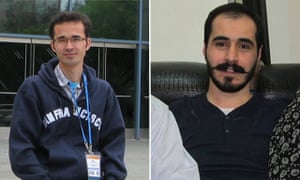
Activists have raised concerns about the health of two prisoners held in Iran on political grounds – an award-winning physicist with cancer and a blogger who has been on hunger strike for nearly a month.
In an episode that highlights Iranian authorities’ denial of crucial medical care to prisoners of conscience, physicist Omid Kokabee, 34, had surgery on Wednesday to remove his right kidney, taken out after repeated warnings about his condition were ignored during five years of his imprisonment.
In a separate case, Hossein Ronaghi, a 30-year-old blogger with one functioning kidney, is believed to be in a critical condition as he continues to refuse food and water in protest at his imprisonment.
Kokabee and Ronaghi are among hundreds of prisoners held in Iranian jails on political grounds or because of their beliefs or civil activities.
Kokabee, a laser physicist with University of Texas, was arrested in Tehran in 2011 after, activists say, he refused to collaborate with Iranian authorities on military projects. More than 30 Nobel physics laureates have called for his release; in 2014, the American Physical Society awarded him the Andrei Sakharov Prize for “his courage in refusing to use his physics knowledge to work on projects that he deemed harmful to humanity”.
Ronaghi was returned to Tehran’s notorious Evin prison in January to resume a 13-year sentencefor insulting Iran’s supreme leader, Ayatollah Ali Khamenei, on his blog.
The victory of the moderate Hassan Rouhani in 2013’s presidential election raised hopes for an improvement in the situation of prisoners of conscience, but despite a small number of high-profile releases, human rights are still routinely flouted and executions are at a record high.
“Denying a prisoner necessary medical care is both cruel and unlawful,” said Sarah Leah Whitson, Middle East director at Human Rights Watch. “Iranian authorities should ensure that Kokabee will have access to adequate medical care, which in his case is likely to be outside prison.”
“Iran has a dismal record of providing prisoners, especially those convicted of politically motivated charges, access to necessary medical treatment,” she said.
No comments:
Post a Comment